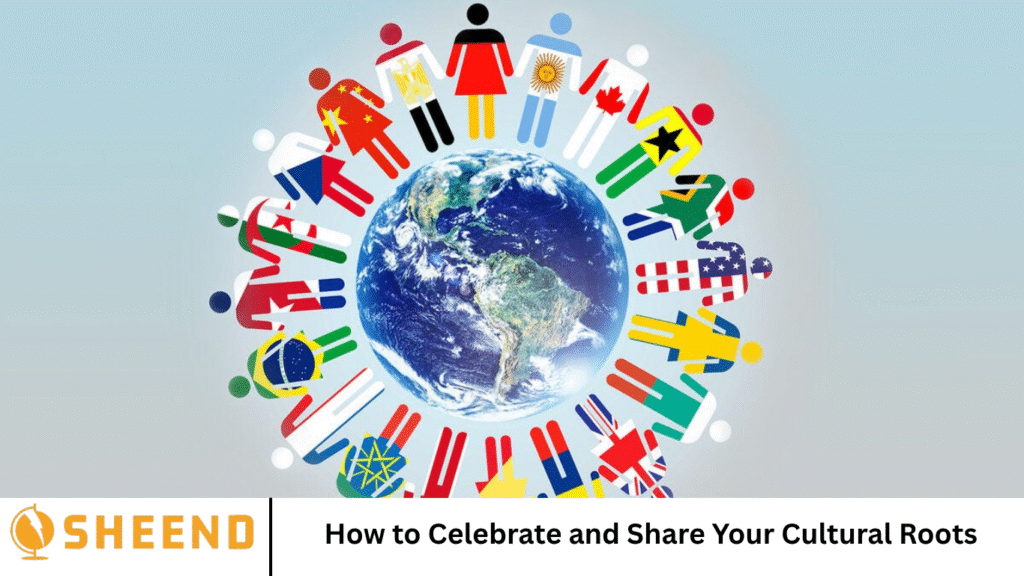In a world that’s growing more interconnected every day, cultural diversity has become one of our greatest strengths. Each individual carries within them a treasure trove of heritage, traditions, and stories passed down through generations. , one of the most empowering things you can do is embrace and share your own heritage.
Celebrating and sharing your cultural roots is not only a powerful way to stay connected with your identity but also an opportunity to enrich your community and promote inclusivity. Whether you’re living abroad, part of a multicultural society, or simply want to reconnect with your origins, there are countless ways to honor and share where you come from.
This article explores how to celebrate and share your cultural roots meaningfully, from everyday practices to larger community events, offering a roadmap for personal pride and cultural education. In today’s globalized world, we’re constantly surrounded by diverse traditions, languages, and beliefs. Amid this rich cultural tapestry.
More Read: Studying Abroad for Success: The Power of Cultural Exchange Programs
Understand Your Cultural Roots
Before you can share your heritage, it’s important to truly understand it. Your cultural roots may include your ethnic background, the country your ancestors came from, language, customs, religious beliefs, artistic expressions, and more.
Ways to Deepen Your Understanding:
- Interview Family Members: Ask your parents, grandparents, or relatives about their lives, values, and traditions.
- Explore Genealogy: Use tools like Ancestry.com or MyHeritage to trace your family tree.
- Research History: Read about the history and socio-political developments of your native culture.
- Learn the Language: If you don’t speak your ancestral language, take the time to learn it—even basic phrases can reconnect you to your roots.
Gaining this knowledge allows you to become a better storyteller of your culture and pass it on with confidence.
Preserve and Practice Cultural Traditions
One of the most effective ways to celebrate your heritage is by keeping its traditions alive in your daily life. Whether it’s through religious practices, holidays, or rituals, incorporating these customs reinforces your identity.
Examples of Traditions to Celebrate:
- Cultural Holidays: Celebrate Diwali, Eid, Hanukkah, Chinese New Year, etc., and invite others to learn about their meanings.
- Traditional Clothing: Wear cultural attire during special events or festivals.
- Rituals and Ceremonies: Participate in coming-of-age rituals, weddings, or religious ceremonies rooted in your culture.
Even small acts—like lighting candles, wearing symbolic jewelry, or reciting a traditional blessing—can foster a deeper sense of connection.
Share Your Culture Through Food
Food is one of the most accessible and universal ways to connect cultures. Cooking and sharing traditional dishes allow others to experience the flavors and stories behind your background.
How to Share Culture Through Food:
- Host a Cultural Dinner Night: Invite friends or coworkers and cook a traditional meal while explaining the significance of each dish.
- Start a Food Blog or YouTube Channel: Share recipes, cooking techniques, and stories behind your cuisine.
- Participate in Cultural Food Festivals: Set up a booth or offer to cook for community events.
Not only does food create an avenue for storytelling, but it also offers an immersive sensory experience that people tend to remember.
Use Art and Creative Expression
Art transcends language and is a powerful way to communicate your culture. Through visual arts, music, dance, literature, or fashion, you can honor your heritage and invite others to engage with it.
Creative Ideas to Share Your Culture:
- Paint or Draw Cultural Symbols: Use art to depict myths, legends, or landscapes from your background.
- Perform Traditional Music or Dance: Join a local group or record and share your performances online.
- Write Stories or Poems: Publish tales inspired by your upbringing or ancestral folklore.
- Fashion and Design: Wear or create garments that showcase patterns, materials, or motifs native to your culture.
Artistic expression is not only a personal celebration but also an invitation to others to appreciate your roots.
Get Involved in Cultural Organizations and Events
Community plays a vital role in cultural preservation and celebration. Engaging with cultural groups—whether formally or informally—builds support systems and amplifies your ability to share your heritage.
How to Get Involved:
- Join Cultural Clubs or Associations: Look for groups in your city, school, or online.
- Attend Cultural Festivals: Participate in local parades, fairs, or exhibitions that highlight different heritages.
- Volunteer at Multicultural Events: Help organize or host events that showcase global diversity.
- Create a Cultural Awareness Workshop: In schools or workplaces, offer to host sessions on cultural etiquette, history, or values.
These experiences offer a safe space to express your identity and inspire others to do the same.
Share on Social Media and Digital Platforms
In the digital age, the internet offers a vast stage for cultural storytelling. Sharing your experiences and traditions online helps bridge cultural gaps and educates a wider audience.
Ways to Use Digital Tools:
- Instagram and TikTok: Create short videos or reels showcasing traditional dances, food prep, or language tips.
- Blogs and Newsletters: Write about personal experiences, history lessons, or cultural controversies.
- Podcasts or YouTube Channels: Launch a series discussing cultural stories, interviews with elders, or showcasing cultural destinations.
- Create Educational Content: Develop infographics or mini-courses for those wanting to learn more about your heritage.
Social platforms make it easy to reach people globally and offer a consistent way to represent your culture authentically.
Pass It On to Future Generations
Celebrating and sharing your roots isn’t just about self-expression—it’s about legacy. It’s crucial to ensure your traditions live on through future generations.
Tips for Passing It On:
- Teach Children Your Language and Customs: Begin early and integrate cultural practices into everyday life.
- Create a Family Culture Book: Include recipes, stories, photos, and historical context.
- Celebrate Milestones Traditionally: Incorporate cultural rites of passage, even in modern settings.
- Encourage Cultural Pride: Avoid framing your background as something secondary or hidden—make it something to be proud of.
Passing on your heritage builds cultural resilience and identity in children, giving them a stronger sense of belonging and self-worth.
Frequently Asked Question
Why is it important to celebrate your cultural roots?
Celebrating your cultural roots reinforces your identity, builds self-esteem, and connects you with your history. It also promotes cultural awareness and understanding in your community, fostering a more inclusive society.
How can I share my culture if I’ve grown up far from it?
Start by researching your background, speaking with older relatives, and learning about your traditions. You can also join cultural groups or use online resources to reconnect and then share what you learn with others through food, art, or social media.
What are some simple ways to share my culture at work or school?
Bring traditional food for a potluck, host a short presentation during multicultural events, share a story or item from your culture, or create a cultural bulletin board. Even wearing traditional attire on special days can start conversations.
Can I share my culture even if it’s not widely known or popular?
Absolutely! Every culture has unique beauty and value. Sharing lesser-known traditions can educate and enrich others, helping expand global understanding and appreciation.
How do I handle cultural misunderstandings when sharing my traditions?
Approach with patience and empathy. Use questions as teaching moments rather than taking offense. Explain the significance and meaning behind the traditions kindly, helping others see the value in your heritage.
How can I celebrate my culture with kids or younger relatives?
Tell cultural stories, cook traditional meals together, teach them a song or dance, celebrate holidays, or take them to cultural events. Make the experiences fun and meaningful to keep them engaged.
Is it okay to mix modern lifestyle with traditional culture?
Yes. Cultural identity evolves, and mixing modern and traditional elements allows you to stay connected while adapting to contemporary life. As long as traditions are respected, cultural fusion can be a beautiful form of expression.
Conclusion
Your cultural roots are a vital part of your story—and the world is richer when you share them. Whether through food, language, art, or community engagement, celebrating your heritage helps bridge divides and fosters understanding. It strengthens your identity while inviting others into your world. As globalization continues to blend borders, your culture remains a unique fingerprint—one that deserves to be honored, preserved, and passed on.


